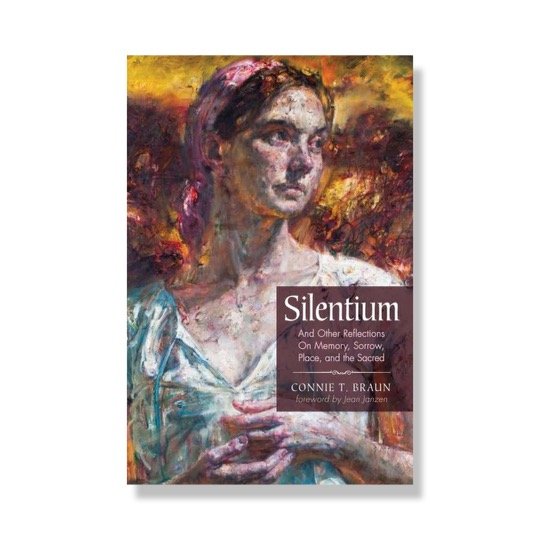
Non-Fiction & Journal Publications
Silentium: and Other Reflections on Memory Sorrow Place and the Sacred
With this collection of meditative, personal, memoir, and lyrical essays and narrative poetry, Connie T. Braun explores the multi-valences of silence within themes of loss, displacement, identity, heritage, and faith. Reflecting on her childhood in Canada, and her ancestral Mennonite homeplace, these pieces form a memoir about her maternal grandparents' and her mother's life in Poland, their experiences of war and displacement, and their eventual immigration and acculturation.
The Steppes are the Colour of Sepia: a Mennonite Memoir
The ordinary lives of many Canadians belie the amazing stories of uprooting, wandering and loss that was their daily experience before migrating to this country as refugees. In this memoir, Connie Braun, a first generation Canadian, discovers the past, and a former life on the Russian and Ukrainian steppes. From a small collection of sepia photos, past family members emerge, and through these photographs, along with documents, her own research, and talks with her father, Connie finds her way back to the present.
Journal Publications
Illumine, University of Victoria, “Aemilia Lanyer’s Salve Deus Rex Judaoerum: Proto-feminism, Piety or Transcendence?”
Aemilia Lanyer continues to be a controversial figure in the early modern tradition. Lanyer was not an aristocrat; her connections to the court included a sexual liaison with Queen Elizabeth’s cousin and her dedication in Salve Deus Rex Judaeorum (1611) was to women of nobility. Despite her less than “virtuous” background and in the face of her possible financialor feminist ambitions, the Christian influences evident in her poetry suggest that Lanyer was a spiritually motivated woman whose work offers a hermeneutic for authentic Christian spirituality.
Equinox, Religious Studies and Theology, “Of the Body: Lineage and Threshold in Anne Michaels’s Correspondences, All We Saw and Infinite Gradations.
Anne Michaels, of Jewish heritage, is most recognized for her critically acclaimed Holocaust novel, Fugitive Pieces, the subject of substantial scholarship. Less is written about her latest works of poetry and lyric prose. Returning to themes of time, death, the sanctity of life, and love that animate and vitalize her literary corpus, she gathers intellectual, scientific, artistic, and moral influences, drawing – and drawing upon – a lineage, not genetic, but of consciousness. And while, in her view “not religious,” the body is the site of pragmatic faith, the will to carry on from loss, and is also a limit, a threshold.
Renascence: Essays on Values in Literature, Marquette University Press “The Affirmation of Being in the Poetics of Trauma: The Voice of Anne Michaels.”
The internationally acclaimed Canadian author Anne Michaels captures the experience of trauma and subverts the post-holocaust injunction of “no more poetry.” Her poetics engender the concept of transcendence as developed in the literary theories of Paul Ricoeur, George Steiner, Max Picard, Viktor Frankl and Elie Wiesel, and as Michaels attests to being, life and justice, her poetry is in adherence with the literary premises of Czeslaw Milosz, a poet in exile, who regarded poetry as a witness of our lives and claimed that the work of a poet was to be “against nothingness.”
Demeter Press, Mennonite Mothering. Edited by Rachel Epp Buller and Kerry Fast.
Mothering Mennonite marks the first scholarly attempt to incorporate religious groundings in interpretations of motherhood. The essays included here broaden our understanding of maternal identity as something not only constructed within the family and by society at large, but also influenced significantly by historical traditions and contemporary belief systems of religious communities.

